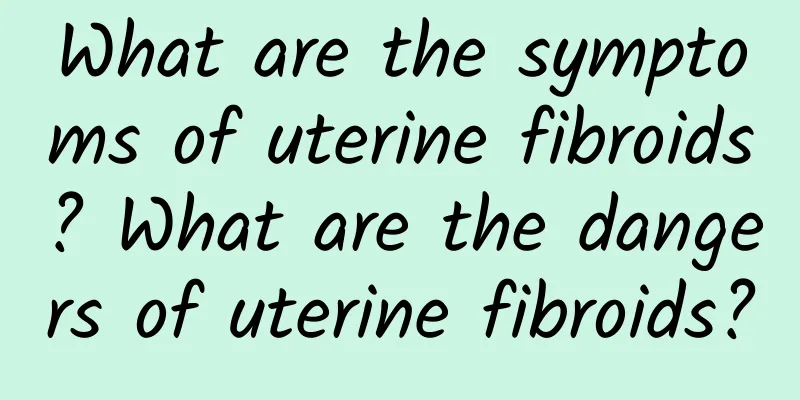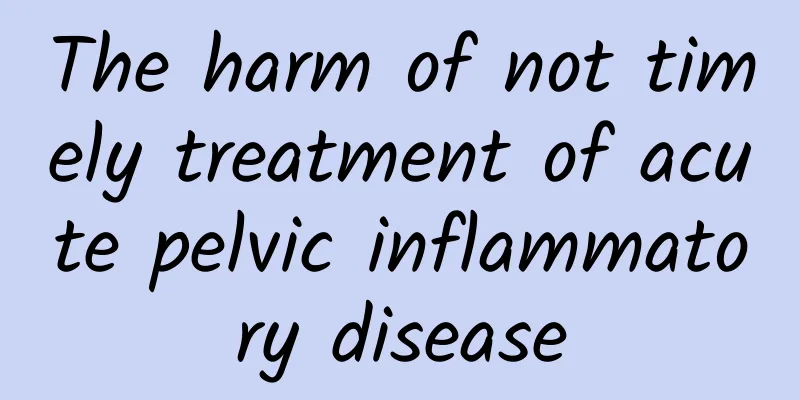What are the symptoms of uterine fibroids? What are the dangers of uterine fibroids?

|
Uterine fibroids are a type of benign uterine tumor with a high prevalence rate. They are more common in women of childbearing age. Uterine fibroids are very harmful. In the early stages of the disease, the patient has no abnormalities or is not obvious, which can easily delay treatment. So, what are the symptoms and hazards of uterine fibroids? Symptoms of uterine fibroids are as follows: 1. Increased leucorrhea. Patients with uterine fibroids will have signs of increased leucorrhea, and some will also produce a large amount of purulent or bloody leucorrhea, accompanied by a foul odor. 2. There is a lump in the abdomen. The patient will feel swelling in the lower abdomen and touch the lump with his hands, accompanied by a feeling in the lower abdomen. 3. Menstrual abnormalities are the most common symptoms of uterine fibroids, which may manifest as prolonged or shortened menstrual cycles, increased menstrual volume, and irregular vaginal bleeding. 4. Compression symptoms: Uterine fibroids can grow forward or backward, compressing other organs in the pelvic cavity, including the bladder, urethra or rectum, causing frequent urination, dysuria, urinary retention or constipation. Uterine fibroids are harmful to women: 1. Infection and suppuration Uterine fibroids can cause pelvic congestion and infection. The infection is mainly the consequence of tumor pedicle torsion, while hematogenous infection is extremely rare. After infection, a few patients will form abscesses in the tumor tissue, and the rest will be suppurative. 2. Adhesion or inflammation. After the subserosal uterine fibroid pedicle is twisted, intestinal adhesion will occur, and then intestinal bacteria will be infected. Inflammatory fibroids will adhere to the uterine appendages, causing suppurative inflammation. On the other hand, fibroids can also cause bacteria to invade other uterine organs, causing gynecological inflammation such as adnexitis and pelvic inflammatory disease. 3. Secondary anemia. Uterine fibroids can cause excessive menstrual bleeding. Over time, it can lead to secondary anemia and even anemic heart disease. In severe cases, patients will experience adverse symptoms such as general fatigue, pale complexion, palpitations and shortness of breath. |
<<: Symptoms of uterine fibroids Will uterine fibroids compress the bladder?
>>: Symptoms of uterine fibroids. Will uterine fibroids cause abnormal leucorrhea?
Recommend
How much does ectopic pregnancy surgery cost? It depends on the patient's physical condition
If the fertilized egg implants and grows outside ...
Can gastroptosis cause uterine prolapse?
Gastroptosis does not directly cause uterine prol...
Diet after cervical precancerous lesions surgery
What are the dietary principles for cervical prec...
How long after abortion can I have sex?
How long after an artificial abortion can you hav...
Pituitary function tests for amenorrhea
There are many examination methods for patients w...
What harm does vaginitis do to the body
We all hope that vaginitis can be treated as soon...
Can female cervicitis be cured? Precautions for female treatment of cervicitis
Generally speaking, when cervicitis is not infect...
What are the treatments for cervical precancerous lesions?
How effective is surgery for the treatment of cer...
Diabetes sugar-removing medicine reduces the calories of 1 soft-serve ice cream per day
Winter is a great time to nourish your body, as t...
Daily care tips for endometrial tuberculosis
The cause of endometrial tuberculosis is relative...
Which hospital is good for treating vaginitis?
Which hospital is good for treating vaginitis? Th...
Regular pre-abortion check-ups are especially important for women
Female abortion is a common surgery, and many wom...
Here are some symptoms of vulvar leukoplakia:
Vulvar leukoplakia is one of the common gynecolog...
The most common causes of vaginal candidal infection
There are many types of vaginitis in clinical pra...
5 alternative movements to make abdominal muscle training easier and more powerful for beginners!
An important part of getting started is to focus ...









